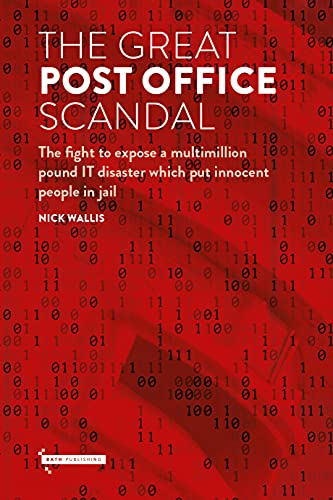We live in an age saturated with corporate scandals, public and private sector both, marked by greed, lies, callousness and cover up. But amongst them all, the Post Office scandal stands out.
It has lasted the best part of two decades and has destroyed the lives of many hundreds of innocent people. But what most distinguishes it is the ferocious, secretive and completely pointless cruelty of the Post Office towards its own people. It’s rightly been called the greatest miscarriage of justice in modern British history. I was wondering what it reminded me of: of course, it's Stalin's Great Terror, as recounted by Orlando Figes. Of course, these victims were not being tortured or executed, but there’s the same sense of loyal, innocent servants of the State being hounded by the State towards oblivion, for no reason whatsoever. In brief: the Post Office introduced a new computerised accounting system, Horizon, around 2000, rolling it out without proper testing, and knowing it to be highly defective, operating it in a way that was both chaotic and secretive, and then when it generated false balances in sub Post Offices, hounding hapless and innocent sub postmasters by demanding they make good the difference from their own funds, then terminating their contracts, prosecuting them, sending many to prison and seizing everything they own, all the while denying that there were any problems with Horizon and - this was truly diabolical - telling each sub postmaster that nobody else had any problems with the system. The Post Office was able to do this because they retained their own private prosecution system in house. For all other crimes the decision to prosecute and handling of prosecution had long been separated out from the police and given to the Crown Prosecution Service, and one sees from this story how necessary that separation is. The Post Office refused to give those accused access to the data that might have saved them and made use of an absurdly oppressive and unfair contract which few of them had seen in full, or if seen, understood. As prosecutions mounted, and innocent sub postmasters and pace mistresses were driven into bankruptcy, mental illness, shame, imprisonment, ill health and in some cases suicide, the Post Office lied and lied and lied. It denied that they had retained the ability to change figures in individual sub Post Office accounts centrally, without telling the account holder. It denied there was any problem with Horizon, but in fact it was overwhelmed bad tsunami of errors and bugs. It deliberately suppressed all mention of independent reports which confirmed that there were serious problems. It deliberately failed to disclose material in its possession which was its duty to disclose in proceedings. The conduct of the Post office at senior and middle management levels was truly wicked. Gradually and over many years a series of curious reporters, most of all Wallis, were drawn into investigating and eventually exposing and overturning these injustices. But one is not left with a sense of wrongs righted for two reasons. Too many people have had their lives shattered , their reputations destroyed, years spent in prison, savings and houses seized. Compensation cannot compensate for all that. And secondly there is at the end of it no justice: of a wide cast of wicked people at senior and middle management levels in the Post Office and in Fujitsu and in in the sub post masters own representative body, which took the side of the Post Office against its members, none have been brought to justice in any way. They simply retired on nice pensions and averted their eyes from the evil they had done. The current statutory inquiry will one hopes give some of these people a very unpleasant public grilling, but probably no more than that. Some of them deserve to be imprisoned: they wont be. This account of the scandal is outstanding in every way. It is long - some 800 pages on Kindle - because the scandal went on for long time, and was endlessly complicated, but it is a surprisingly easy read. Wallis breaks it up into quite short chapters, without breaking the narrative flow telling the stories of many of the individual victims in a way that is simply devastating. You cannot believe that such things could be allowed to happen: nor did the victims themselves, until they did happen. Wallis sets out to explain 2 sets of complicated, technical things: the operation and faults of the Horizon system itself, and the intricacies of the many court cases, one on top of the other. He does so very fully, without dumbing down come up but in a way that's surprisingly easy to follow. This is a very great skill. On top of that there's the thrill of the chase, with false turns, blocked routes and sudden breakthroughs, as a motley crew of reporters gradually begin to uncover the true horror and scale of the scandal. (One of the things I very much like about the account is the way the author gives full credits to other journalists.) One is left wondering, as ever, why people behave this badly? After all there was no question of financial gain, either to individuals, or the Post Office as an organisation (the same cannot be said of Fujitsu, whose appalling behaviour has not been fully recognised, and seems to have been motivated basically by money). No, the main motivator seems to have been that old, old vice, tribal or group thinking, us against them, ‘them’ the outsiders who don't understand our problems, who want to do us down, when we're doing our best, ‘them’ who have only bad motivations and who must be defeated at any cost. A warning from history indeed.
0 Comments
Execution of disgraced mandarin. No Oxbridge College for him!
Someone asked me the other day, in relation to my recent posts about the ghastly mix of incompetence and cruelty in the Home Office, whether I thought civil servants who failed should be sacked. in general, no. I saw that policy or I should see instinct at work under Michael Howard, a man whose first thought under fire was to interpose the body of one of his servants between himself and the bullets. It is a bad policy for several reasons. As Putin has discovered, it leads to people telling you what you want to hear rather than what you need to know, and to people doing what is safe rather than what is necessary. Moreover, in large complicated organisations dealing with complicated matters, failure usually involves many people in varying degrees of culpability. Moreover , if somebody is in a role where they are completely incompetent, there are questions about the person who appointed them and the person who managed them. Moreover, the emphasis needs to be on learning from failure not on punishing it, and the second tends to get in the way of the first Sometimes, too, failure at a very senior level is inseparable from ministerial failure, eg failure to set the right priorities or provide necessary resources. But equally I do not think it is healthy for there to be no consequences whatsoever in the case of egregious failure, which is what happens in the civil service. At senior level, it is almost unknown for anybody to pay any penalty whatsoever. As far as I can ascertain no permanent secretary has been made to resign or be demoted since before WW2. Usually a senior civil servant who has failed on a big scale is promoted at exactly the same pace as if they had succeeded. That can't be right. (Case in point, Antonia Romeo, Senior Responsible Officer for the single greatest disaster in justice policy in a generation, the probation privatisation programme, that had to be expensively cancelled after years of critical inspection reports, has now become..... Permanent Secretary at the MoJ. Equality of opportunity was not supposed to mean promoting failure on an equal basis with success.) The circumstances in which I think there should be a penalty of some sort for failure - I'm talking of failure to do the job or deliver a reasonable service, not something like fraud, sexual harassment etc - are as follows. When someone does something or fails to do something which they ought to know will cause serious failure, or serious harm. When someone covers up or lies about serious failure. When someone allows a serious failure to continue over a period , without doing anything about it or reporting it . And when a senior person takes delivery of a report exposing serious failure and is charged with ensuring that there is an improvement, fails to do so. Outside of those circumstances, failure should be treated as an inherent aspect of work. It should be acknowledged, if necessary apology made, its causes should be ascertained and put right, which might mean more resources, doing things differently, retraining, or moving someone. But in most cases not punishment. But note that - public acknowledgement, public apology. An anonymous email, probably from a civil servant, once accused me of believing I was always right. He had obviously not read my book, of which a few copies are still available incidentally, which is full of my reflections on what I did not get right, or not right enough. I've never had any in inhibition about owning up to my failures. That is in part because I had the enormous privilege of working for three quite outstanding leaders, different in many ways, but united in their total integrity. Richard Tilt, Martin Narey, Phil Wheatley. These were not men who needed to be driven reluctantly to admit failure at. They were the first to announce it, driven by consciousness of the moral imperatives of their work, and the need for leadership. People at the top who cannot admit to and own failure are a danger to all around them. They are certainly not leaders. Unfortunately the senior civil service is full of them, including the Permanent Secretaries of the Home Office and of the Ministry of Justice. (By the way, do you know that Antonia Romeo is widely tipped for the next Cabinet Secretary? I put that in here because, sadly, some journalists who profile her fail to mention this in the published article. In point of fact, I think she has every qualification, in terms of how the job is now understood.) |
I was formerly Finance Director of the Prison Service and then Director of the National Offender Management Service responsible for competition. I also worked in the NHS and an IT company. I later worked for two outsourcing companies.
Archives
January 2023
Categories
All
Click below to receive regular updates
|


 RSS Feed
RSS Feed